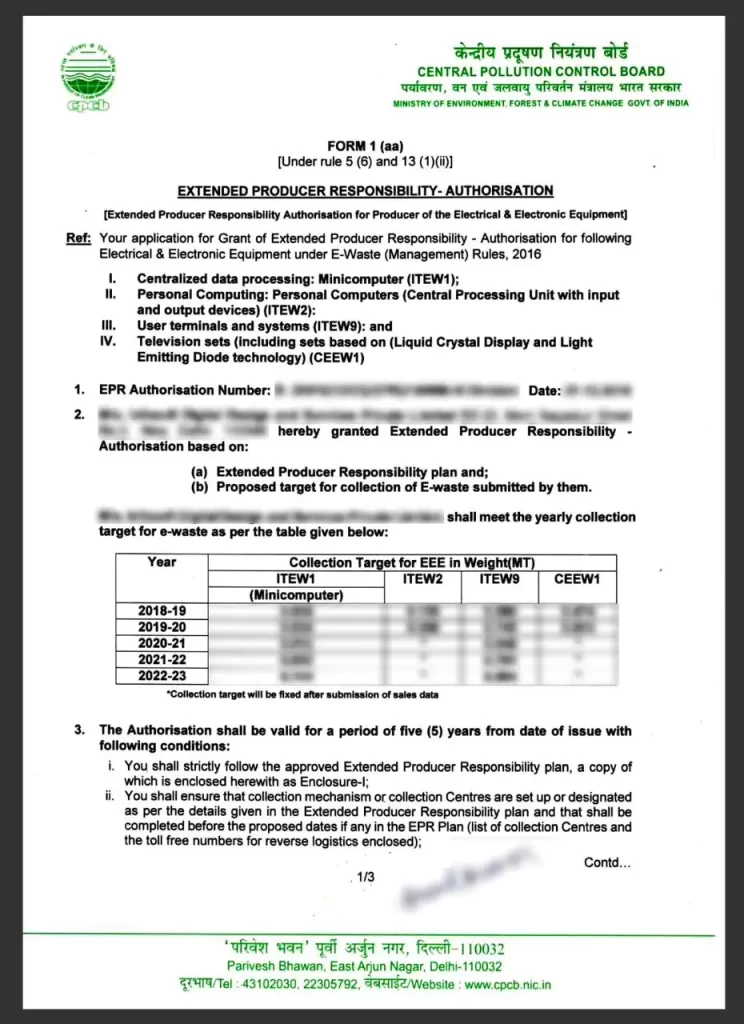Apply EPR License in 1 day and get your Custom Clearance
- Consulted 400 + EPR Registrations
- Free Experts Assistance
- Minimum Price guaranteed
- Quick and Hassle-Free Process
- Free Consultation on Import-Export Compliance
- 20 years experience & Serving more than 1100+ companies
- Providing one stop solution for all Annual compliances
CONTACT US
Our advisor is just a call away
The CPCB (Central Pollution Control Board), of the Ministry of Environment, Forests, Climate Change, Government of India, grants EPR Authorization for any plastic waste, battery waste or E-waste generated by Indian manufactured or imported products.
As part of EPR, or Extended Producer Responsibility, all manufacturers of electronic or electrical equipment, plastic packaging, or batteries are required to recycle or dismantle the waste they produce to ensure it is treated in an ecologically responsible manner.
There are three categories of EPR:
- Electronic Waste Management
- Plastic Waste Management
- Battery Waste Management
-
E-waste Management
In line with the powers conferred by Sections 6, 8, and 25 of the Environment (Protection) Act of 1986, the Central Government introduced the E-Waste (Management) Rules, 2022, which were intended to replace the E-Waste (Management) Rules, 2016. On May 19, 2022, the Indian public had access to these new regulations after they were published in the Indian Gazette by the Indian government’s Ministry of Environment, Forest, and Climate Change. As of April 1st, 2023, they are in force.
Every manufacturer, producer, refurbisher, dismantler, and recycler who creates, sells, transfers, purchases, refurbishes, dismantles, recycles, or otherwise processes any electrical or electronic equipment listed in Schedule I is subject to the regulations. This includes the parts, consumables, spares, and components required to keep the equipment in working order.
-
Plastic Waste Management-
In order to carry out the powers conferred by sections 3, 6, and 25 of the Environment (Protection) Act of 1986 and to replace the Plastic Waste Management(Amendment) Rules of 2016, the Central Government developed new laws known as the Plastic Management Rules, 2022.On July 1, 2022, these regulations came into force.Their suggestions are applicable to plastic packaging.The Plastic Waste Management Rules, 2022 grant Extended Producer Responsibility to Producer, Importer, and Brand Owners (PIBO).
All plastic waste are produced by Plastic packaging producer (P), plastic packaging importers (I) and brand owners (BO) which includes Supermarkets, retail chains, and online marketplaces , in addition to micro and small enterprises.
-
Battery Waste Management-
The Battery Waste Management Rules, 2022 (BWM Rules, 2022) were issued by the Ministry of Environment, Forestry, and Climate Change on August 22, 2022, and they have replaced the Battery (Management & Handling) Rules, 2001. BWM Guidelines, 2022. No matter the chemistry, form, volume, weight, material composition, or intended use of the battery, it is applicable.The following producers are bound by this restriction:
- producing and promoting batteries under its own label, including batteries that have been restored and put to work in machinery.
- sale of batteries, including used and refurbished batteries, made by other manufacturers or suppliers but sold under their own name
- Import batteries and battery-powered equipment.
Importance of EPR Certificate
Holders of EPR registrations can take use of the following advantages:
- Greater brand recognition- Companies that have received EPR accreditation may show their dedication to environmentally friendly practises and ethical waste management. As a result, stakeholders’ and customers’ opinions of their brand may also improve, increasing customer loyalty and trust.
- Upholding the law- To demonstrate that they are taking responsibility for the waste produced by their products, several nations demand that businesses get certificates and adhere to EPR regulations. Businesses can verify that they are in compliance with certain legal requirements by acquiring an EPR certificate.
- Savings- Using eco-friendly waste management techniques may result in decreased disposal costs for businesses while raising productivity. Businesses may show their dedication to reducing waste and how doing so will ultimately save them money by obtaining an EPR authorization.
- Entry to new markets- Businesses with an EPR certificate may be qualified to operate in regions where responsible environmental management and sustainable waste management practises are highly recognised. This might aid businesses in growing their clientele and income streams.
- Improved supply chain management: Companies may lessen the risk of supply chain interruptions brought on by waste-related problems by employing sustainable waste management strategies. The supply chain may thereby become more dependable and effective.
Issuance of EPR Authorization
PROVIDED BY
EPR Authorization is issued by the Central Pollution Control Board (CPBC), a part of the MOEFCC, Government of India.
PROVIDED TO
In India, producers, importers, brand owners, and manufacturers can all apply for an EPR licence. All manufacturers and exporters of product waste must get an EPR certification in India. For domestic makers or importers of electronic and electrical equipment, batteries, and plastic packaging under the EPR permission, the EPR registration is necessary.
Process of EPR Registration
Manufacturers of batteries, electrical items, and other analogous products must adhere to the following procedures in order to submit an application for EPR authorisation in India:
- Create an EPR strategy- The manufacturer is expected to create an EPR plan that describes how they will collect and recycle their items when their useful life are finished. The EPR plan should include information on the types and amounts of trash that will be collected and recycled, as well as the procedures followed and the dates by which these goals will be accomplished.
- Finish the application- On the Central Pollution Control Board website, where the producer’s manufacturing plant is located, finish the EPR registration application.
- Include all required papers- The producer must include the EPR authorization application form and other required paperwork.
- Submit the application- Depending on where their manufacturing plant is located, the producer must submit the EPR permission application form together with all necessary supporting documentation to the Central Pollution Control Board.
- Await approval- The CPCB may want further data after reviewing the EPR authorisation application. The manufacturer will be given the EPR approval certificate upon application approval.It is crucial to remember that the EPR certificate must be renewed on a regular basis in accordance with the rules established by the CPCB.
Documents required for EPR Registration for Importers
Details & Company
Details of authorized person
Other important Documents
Details & Company
- PAN Card Gst Certificate
- CIN of Company
- IEC Certificate For Importer
- Partnership deed in case if partnership firm
Details of authorized person
- Aadhar Details
- PAN of Authorized person
- Scanned copy of signatures of authorized persons
Other important Documents
- DIC Registration (if unit registered with DIC)
- Covering letter
- Document regarding any other information which the unit wishes to provide
Sample of a Grant EPR Certificate

Documents required for EPR Registration for Importers
- PAN Card Gst Certificate
- CIN of Company
- IEC Certificate For Importer
- Partnership deed in case if partnership firm
- DIC Registration (if unit registered with DIC)
- Covering letter
- Document regarding any other information which the unit wishes to provide
Our Partners
We believe to build a strong network of clients and to serve the eco-system with mutual benefits. Some of our esteemed clients are:























